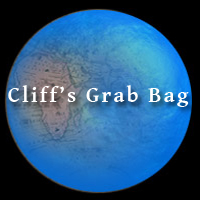-
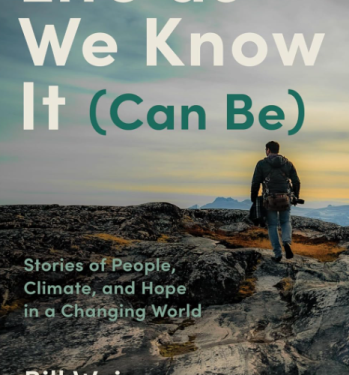 Award-winning journalist and CNN chief climate correspondent Bill Weir draws on his years of immersive travel and reporting to share the best ideas and stories of hope and positivity from the people and communities around the world who are thriving in the wake of climate change, and what we can learn from them to build a more promising future.
Award-winning journalist and CNN chief climate correspondent Bill Weir draws on his years of immersive travel and reporting to share the best ideas and stories of hope and positivity from the people and communities around the world who are thriving in the wake of climate change, and what we can learn from them to build a more promising future. -
 If you’ve heard any maloya music from the Indian Ocean island of Réunion, the chances are it brings to mind a characteristic rhythm played on percussion, and probably an image of today’s best-known maloya musician internationally, Danyel Waro, energetically shaking his rectangular flat kayamb shaker. Ann O’aro’s third recording isn’t at all like that, even though she’s toured with Waro, and his son Bino is the percussionist in her band, along with trombone player Teddy Doris and electronic manipulations by Brice Nauroy. Bleu is an album far from the usual, far from what’s generally thought of as maloya, and indeed music that wouldn’t immediately be identified as from Réunion. For both Ann O’aro and the music of Réunion, it’s quite a step, and an interesting one. Read Andrew Cronshaw's review and listen to some of the music.
If you’ve heard any maloya music from the Indian Ocean island of Réunion, the chances are it brings to mind a characteristic rhythm played on percussion, and probably an image of today’s best-known maloya musician internationally, Danyel Waro, energetically shaking his rectangular flat kayamb shaker. Ann O’aro’s third recording isn’t at all like that, even though she’s toured with Waro, and his son Bino is the percussionist in her band, along with trombone player Teddy Doris and electronic manipulations by Brice Nauroy. Bleu is an album far from the usual, far from what’s generally thought of as maloya, and indeed music that wouldn’t immediately be identified as from Réunion. For both Ann O’aro and the music of Réunion, it’s quite a step, and an interesting one. Read Andrew Cronshaw's review and listen to some of the music. -
 "Sometimes it can be better to accept and not examine things too deeply. Let it flow and enjoy it. Take Tranquebar's music. In many ways, what the Danish band creates shouldn't work. The mix of banjo, voice, accordion, and percussion is beautifully ramshackle (at least on the surface). Yet it succeeds, and it does it in a fashion that's quite mesmerizing. Ø is actually a collection of four EPs, each recorded on a different Danish island (hence the title, as Ø means island). And each island exerts a subtle influence on the shading of the music." Chris Nickson, in his review in RootsWorld.
"Sometimes it can be better to accept and not examine things too deeply. Let it flow and enjoy it. Take Tranquebar's music. In many ways, what the Danish band creates shouldn't work. The mix of banjo, voice, accordion, and percussion is beautifully ramshackle (at least on the surface). Yet it succeeds, and it does it in a fashion that's quite mesmerizing. Ø is actually a collection of four EPs, each recorded on a different Danish island (hence the title, as Ø means island). And each island exerts a subtle influence on the shading of the music." Chris Nickson, in his review in RootsWorld. -
 It's a year and a half since Simon Emmerson, the founder and guiding light of Afro Celt Sound System, died. But the band lives on, playing a fresh set of dates to coincide with the release of OVA, Emmerson's swansong with the group. It's a beautiful piece of work, and from the opening notes of "The Hawk Owl's Lament," which swoops and glides, rises and dives like the bird, everything is pitched just right. It's a reminder of just what he achieved with Afro Celt Sound System, as well as all his other projects. He was the imagination behind them all, and the glue that held them together. Chris Nickson, in his review in RootsWorld.
It's a year and a half since Simon Emmerson, the founder and guiding light of Afro Celt Sound System, died. But the band lives on, playing a fresh set of dates to coincide with the release of OVA, Emmerson's swansong with the group. It's a beautiful piece of work, and from the opening notes of "The Hawk Owl's Lament," which swoops and glides, rises and dives like the bird, everything is pitched just right. It's a reminder of just what he achieved with Afro Celt Sound System, as well as all his other projects. He was the imagination behind them all, and the glue that held them together. Chris Nickson, in his review in RootsWorld. -
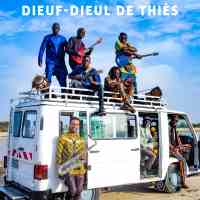 Mbalax rhythms underpin split-second horn blasts, hypnotic, stoned discharges of Seck’s fuzz-drenched lead guitar, and Sarr’s deep, soaring vocals on the long awaited return of Senegambian band Dieuf-Dieul De Thiès. Recorded on analog equipment brought to St. Louis, Senegal from France, with the rhythm section recorded live while vocals and horns were tracked in separate booths, the music percolates, complimenting their earlier work without feeling forced or antiquated. Bruce Miller, in his review in RootsWorld.
Mbalax rhythms underpin split-second horn blasts, hypnotic, stoned discharges of Seck’s fuzz-drenched lead guitar, and Sarr’s deep, soaring vocals on the long awaited return of Senegambian band Dieuf-Dieul De Thiès. Recorded on analog equipment brought to St. Louis, Senegal from France, with the rhythm section recorded live while vocals and horns were tracked in separate booths, the music percolates, complimenting their earlier work without feeling forced or antiquated. Bruce Miller, in his review in RootsWorld. -
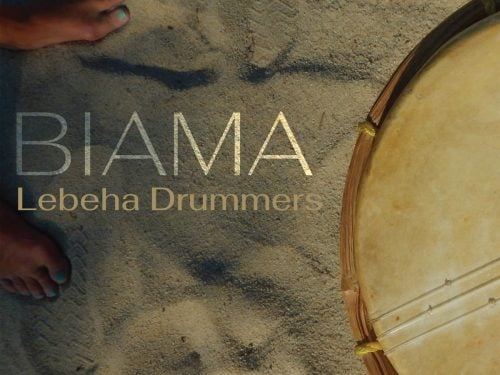 Lebeha Drummers formed in 2003 in Hopkins Village in Belize as an after-school program dedicated to nurturing and transmitting the music’s unique percussion, vocals, and dance styles to young Garifuna. Rooted in Garifuna spiritual practices, its energetic percussive character, dance movements, and vocals resonate with other West African and Amerindian genres brought together in a cultural efflorescence inadvertently sparked by the European colonial adventure in the erstwhile New World. Michael Stone, in his review in RootsWorld.
Lebeha Drummers formed in 2003 in Hopkins Village in Belize as an after-school program dedicated to nurturing and transmitting the music’s unique percussion, vocals, and dance styles to young Garifuna. Rooted in Garifuna spiritual practices, its energetic percussive character, dance movements, and vocals resonate with other West African and Amerindian genres brought together in a cultural efflorescence inadvertently sparked by the European colonial adventure in the erstwhile New World. Michael Stone, in his review in RootsWorld. -
 A practical and comprehensive guide to surviving the greatest disaster of our time, from New York Times bestselling self-help author and beloved CBS Sunday Morning science and technology correspondent David Pogue. You might not realize it, but we’re already living through the beginnings of climate chaos. In Arizona, laborers now start their day at 3 a.m. because it’s too hot to work past noon. Chinese investors are snapping up real estate in Canada. Millennials have evacuation plans. Moguls are building bunkers. Retirees in Miami are moving inland. In How to Prepare for Climate Change, bestselling self-help author David Pogue offers sensible, deeply researched advice for how the rest of us should start to ready ourselves for the years ahead. Pogue walks readers through what to grow, what to eat, how to build, how to insure, where to invest, how to prepare your children and pets, and even where to consider relocating when the time comes. (Two areas of the country, in particular, have the requisite cool temperatures, good hospitals, reliable access to water, and resilient infrastructure to serve as climate havens in the years ahead.) He also provides wise tips for managing your anxiety, as well as action plans for riding out every climate catastrophe, from superstorms and wildfires to ticks and epidemics. Timely and enlightening, How to Prepare for Climate Change is an indispensable guide for anyone who read The Uninhabitable Earth or The Sixth Extinction and wants to know how to make smart choices for the upheaval ahead.
A practical and comprehensive guide to surviving the greatest disaster of our time, from New York Times bestselling self-help author and beloved CBS Sunday Morning science and technology correspondent David Pogue. You might not realize it, but we’re already living through the beginnings of climate chaos. In Arizona, laborers now start their day at 3 a.m. because it’s too hot to work past noon. Chinese investors are snapping up real estate in Canada. Millennials have evacuation plans. Moguls are building bunkers. Retirees in Miami are moving inland. In How to Prepare for Climate Change, bestselling self-help author David Pogue offers sensible, deeply researched advice for how the rest of us should start to ready ourselves for the years ahead. Pogue walks readers through what to grow, what to eat, how to build, how to insure, where to invest, how to prepare your children and pets, and even where to consider relocating when the time comes. (Two areas of the country, in particular, have the requisite cool temperatures, good hospitals, reliable access to water, and resilient infrastructure to serve as climate havens in the years ahead.) He also provides wise tips for managing your anxiety, as well as action plans for riding out every climate catastrophe, from superstorms and wildfires to ticks and epidemics. Timely and enlightening, How to Prepare for Climate Change is an indispensable guide for anyone who read The Uninhabitable Earth or The Sixth Extinction and wants to know how to make smart choices for the upheaval ahead. -
 Sarah Aroeste - Monastir The album "reveals a panoply of styles, sounds, languages and vocalists, all impeccably arranged and produced." - Andrew Cronshaw in his review in RootsWorld Ladino singer/songwriter, author and activist Sarah Aroeste reconnects with the legacy of her Sephardic homeland of Monastir, a Balkan city at the commercial crossroads between Turkey and Western Europe in what is now North Macedonia. For centuries, this Jewish community flourished alongside its neighbors, enjoying a unique history with its own customs, religious observances, linguistic patterns, and songs, until it was destroyed by the Nazis in 1943. The predominantly Macedonian Orthodox and Muslim population of Monastir/Bitola welcomed Aroeste to help her record 10 songs that give an inside look into the life of Jewish Monastir before WWII wiped it out. From kantikas to romances, and from centuries-old melodies to originals, each song in this album has a story, told by over thirty singers and musicians from Israel, Macedonia, Spain, Germany and the USA.
Sarah Aroeste - Monastir The album "reveals a panoply of styles, sounds, languages and vocalists, all impeccably arranged and produced." - Andrew Cronshaw in his review in RootsWorld Ladino singer/songwriter, author and activist Sarah Aroeste reconnects with the legacy of her Sephardic homeland of Monastir, a Balkan city at the commercial crossroads between Turkey and Western Europe in what is now North Macedonia. For centuries, this Jewish community flourished alongside its neighbors, enjoying a unique history with its own customs, religious observances, linguistic patterns, and songs, until it was destroyed by the Nazis in 1943. The predominantly Macedonian Orthodox and Muslim population of Monastir/Bitola welcomed Aroeste to help her record 10 songs that give an inside look into the life of Jewish Monastir before WWII wiped it out. From kantikas to romances, and from centuries-old melodies to originals, each song in this album has a story, told by over thirty singers and musicians from Israel, Macedonia, Spain, Germany and the USA. -
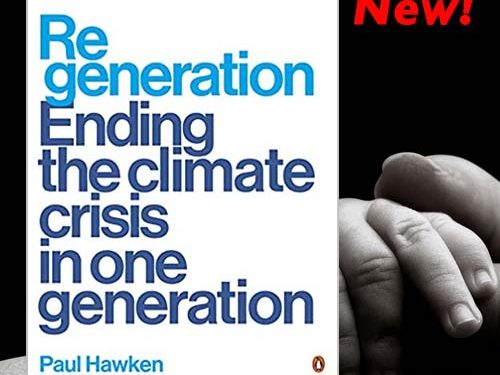 A radically new understanding of and practical approach to climate change by noted environmentalist Paul Hawken, creator of the New York Times bestseller Drawdown Regeneration offers a visionary new approach to climate change, one that weaves justice, climate, biodiversity, equity, and human dignity into a seamless tapestry of action, policy, and transformation that can end the climate crisis in one generation. It is the first book to describe and define the burgeoning regeneration movement spreading rapidly throughout the world. Regeneration describes how an inclusive movement can engage the majority of humanity to save the world from the threat of global warming, with climate solutions that directly serve our children, the poor, and the excluded. This means we must address current human needs, not future existential threats, real as they are, with initiatives that include but go well beyond solar, electric vehicles, and tree planting to include such solutions as the fifteen-minute city, bioregions, azolla fern, food localization, fire ecology, decommodification, forests as farms, and the number one solution for the world: electrifying everything. Paul Hawken and the nonprofit Regeneration Organization are launching a series of initiatives to accompany the book, including a streaming video series, curriculum, podcasts, teaching videos, and climate action software. Regeneration is the inspiring and necessary guide to inform the rapidly spreading climate movement.
A radically new understanding of and practical approach to climate change by noted environmentalist Paul Hawken, creator of the New York Times bestseller Drawdown Regeneration offers a visionary new approach to climate change, one that weaves justice, climate, biodiversity, equity, and human dignity into a seamless tapestry of action, policy, and transformation that can end the climate crisis in one generation. It is the first book to describe and define the burgeoning regeneration movement spreading rapidly throughout the world. Regeneration describes how an inclusive movement can engage the majority of humanity to save the world from the threat of global warming, with climate solutions that directly serve our children, the poor, and the excluded. This means we must address current human needs, not future existential threats, real as they are, with initiatives that include but go well beyond solar, electric vehicles, and tree planting to include such solutions as the fifteen-minute city, bioregions, azolla fern, food localization, fire ecology, decommodification, forests as farms, and the number one solution for the world: electrifying everything. Paul Hawken and the nonprofit Regeneration Organization are launching a series of initiatives to accompany the book, including a streaming video series, curriculum, podcasts, teaching videos, and climate action software. Regeneration is the inspiring and necessary guide to inform the rapidly spreading climate movement. -
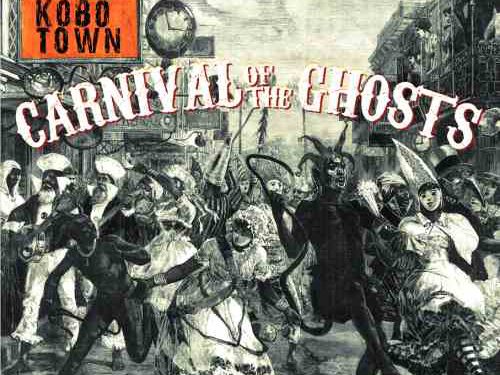
Kobo Town: Carnival of the Ghosts Pledge $50
Kobo Town continues to redefine calypso music and pushes the boundaries of the Caribbean sound with its fourth album. Behind the running social commentary and satirical mood, this is a collection of songs about the human condition – about our quirks and foibles, our anxieties and hopes, and the haunting sense of impermanence that imbues our every moment with its urgency and priceless worth. Named after the storied district in Port-of-Spain, Trinidad, where calypso was born, Kobo Town has been described as “an intoxicating blend of lilting calypsonian wit, dancehall reggae and trombone-heavy brass” (The Guardian) and a “unique, transnational composite of rhythm, poetry and activist journalism” (Exclaim!). “Kobo Town conjures an orphic force and reminds the listener of the vanity of all worldly things.” (RootsWorld) Since their founding in 2005, the group has brought their distinct calypso and ska-inspired sound to audiences across the world. -
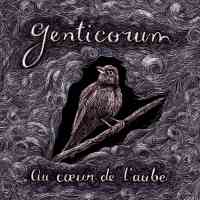 After more than two decades together, the three members of Genticorum form one of the tightest units on the planet. In music from their native Québec (both traditional and original) they have found a rich seam that clearly has plenty of treasures to mine.... It crackles with gleeful energy. The interplay between the instruments and harmonies is sharp and adept, yet still a completely natural, high-octane conversation that constantly shifts from one player to another. Read a review and listen to the music.
After more than two decades together, the three members of Genticorum form one of the tightest units on the planet. In music from their native Québec (both traditional and original) they have found a rich seam that clearly has plenty of treasures to mine.... It crackles with gleeful energy. The interplay between the instruments and harmonies is sharp and adept, yet still a completely natural, high-octane conversation that constantly shifts from one player to another. Read a review and listen to the music.


